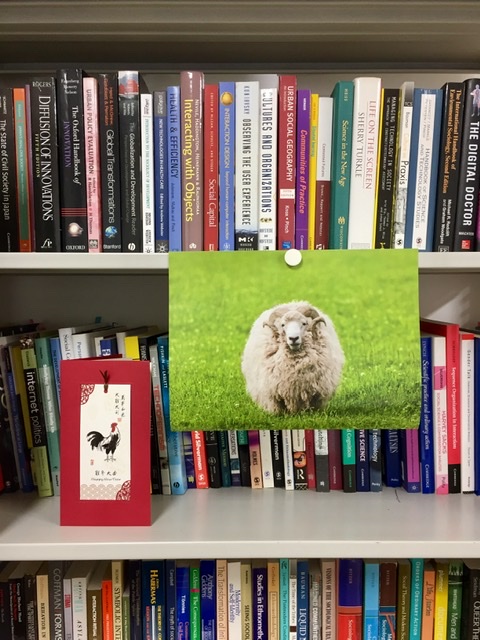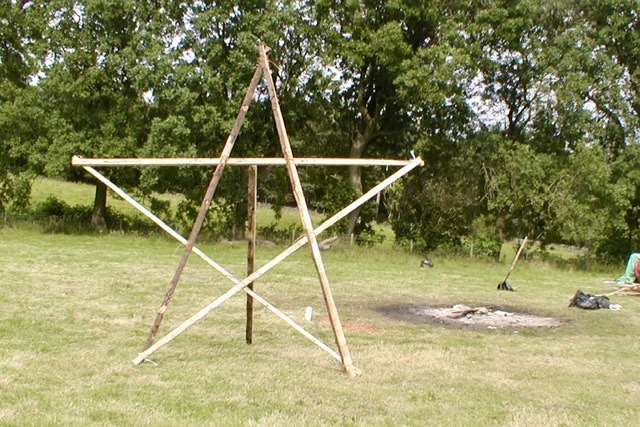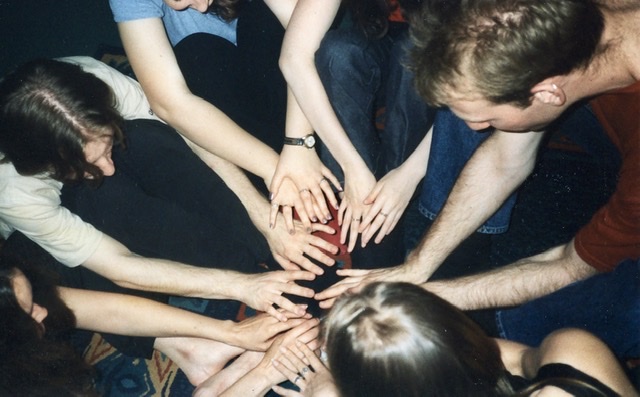I have two libraries of books, one in my office and one at home. Their contents are different and it’s been this way ever since I moved to Japan after completing my PhD. My office books are the public face of my research: I came to Japan to research science policy and the social studies of science and technology (STS). Gradually my research shifted after I moved departments to focus more on user experience and Human-Computer Interaction. My teaching was sociological theory and introductory sociology, so my shelves are filled with the classics—Durkheim, Weber, Marx etc. and some of the typical STS authors like Latour. I have methodology books and computer science books. All very respectable.

My PhD explored how contemporary community (or a ‘sense of community’) can form and be maintained. And this aspect of my research flowed into the work I did on online and offline communities in Japan. It was a theoretical underpinning to my work on science communication and in particular science cafes, which we introduced to Japan in the noughties. Like I say, a respectable public face of a researcher.
But the particular communities that I studied for my PhD would not be seen as worthy of a ‘serious’ researcher by other colleagues, or so I thought for a long time, so I hid that part of my work, pushing it all into the past and focusing only on the scientific or technological topics I was paid to study and teach. That aspect of my research and personal interest lies on the shelves at home. My Doctorate in Sociology studied communities of contemporary Witches and other Pagans. The topic was ‘community’, but the subject was witchcraft and occultism. So in my home I have shelves filled with spell books, grimoires, anthropologies of witches, and studies of occultism. In the process of doing a PhD, one becomes familiar with the academic theories and methods underpinning your research, but one must also, of necessity, become familiar with the ‘object’ of your study. In my case this was magic(k) and modern pagan ritual.
It has been frustrating when asked about my research prior to coming to Japan, as, in order to be seen as a ‘serious’ scholar, I have had to talk only about the study of community and not much about the subjects I studied. But for the three and a half years of doing a PhD I joined Pagan rituals, camps and festivals, worked spells and conducted magick. Serious scientists would laugh when I mentioned this, so I learned quickly not to mention it.

One of the findings of my research was the importance of literature in building community and how referring to it is one way in which members can present a ‘sense of community’. Pagans (and particularly Pagan Witches) at the turn of the century would be well-read. There were classic books that you would be expected to have read and absorbed. I became a well-read Witch.
This is something I think that differs now, with the rise of the TikTok Witches and the vast numbers of solitary Witches that have emerged in this second (actually third) witchcraft boom. That and the influence of American Pagan practices like sage ‘smudging’—a contentious practice seen by some as cultural appropriation—and the ubiquity of crystals. Everything seems to need a crystal at the moment…

Anyway, now I am spending most time at home rather than in the office, I’m enjoying being surrounded by those ‘backstage’ books of mine. I’m proud to say that, yes, I have a PhD in Sociology (of community), but I also have a Doctorate in Witchraft.
Happy Halloween!
This is fascinating. I didn’t know what the focus of your PhD was an now some of things you’ve shared on Twitter make a lot more sense. In a way, there was an overlaps in your interests and what i was doing in my PhD attempt. I was also deeply interested in how communities of practice shaped interpretive habits.
When I first moved to Japan and was working in a new office I was fascinated by the communities of practice idea and the frequent smoking breaks that some of the research members had (with the boss). I actually started taking field notes of each day thinking I might write about it in the future (never did though).
Your PhD attempt sounds interesting!
Now, like Fernandos, I see the connection. By coincidence, my PhD looked at communities, especially security communities in the NE Asian region. I’ve gone beyond that now, much more broadly on the idea of community and politics. Appreciating your posts (even though I’m sometimes late catching up!).
Ah interesting! Community is such an important topic.
Thanks for reading!!